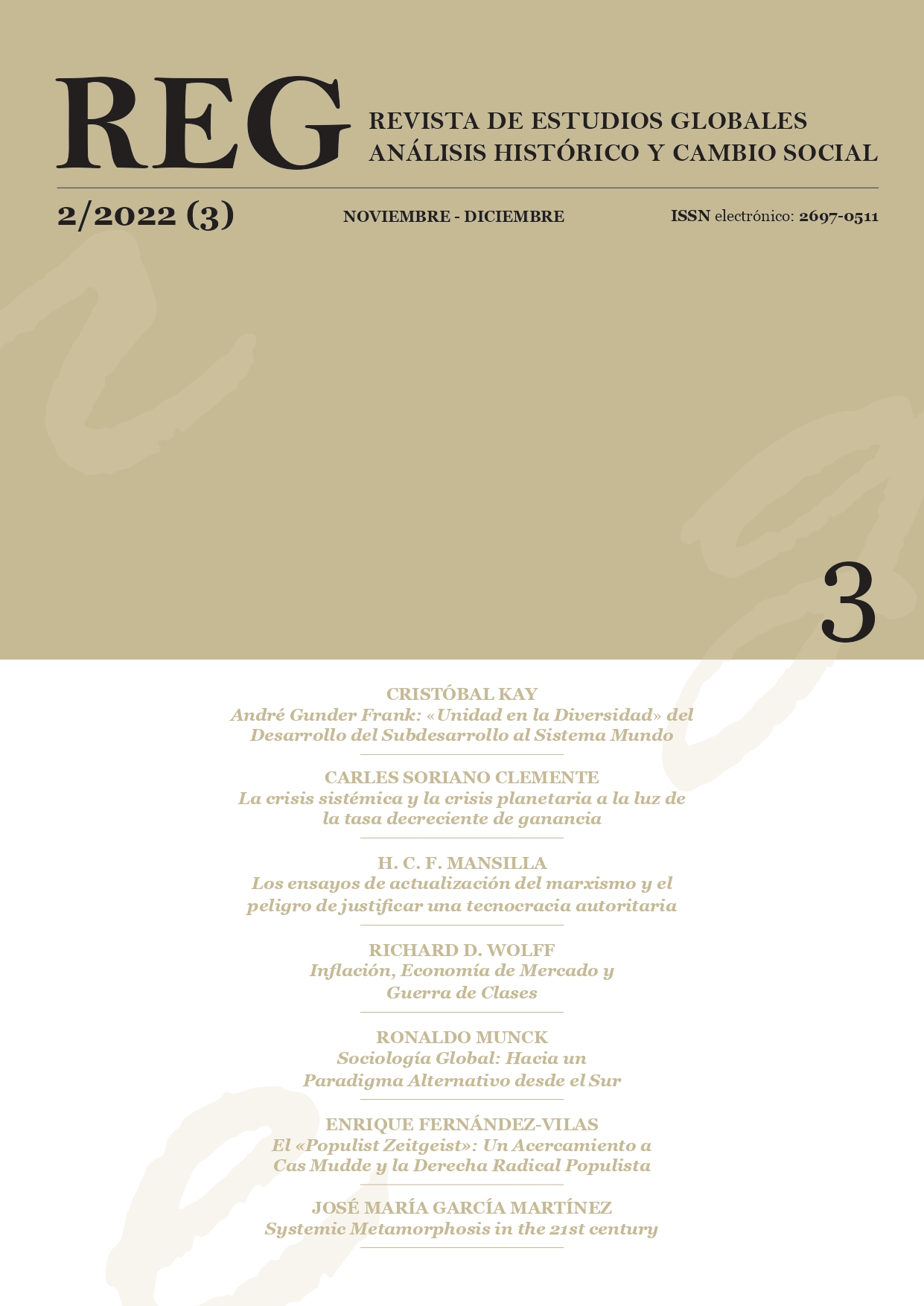El «Populist Zeitgeist»: Un Acercamiento a Cas Mudde y la Derecha Radical Populista
Resumen
El presente artículo supone una aproximación al auge de la ultraderecha global y los populismos de derecha radical, con especial hincapié en Europa a partir de la obra última obra traducida al castellano de Cas Mudde, La ultraderecha hoy (Paidós, 2021), publicado originalmente como The Far Right Today (Polity Press, 2019). Se analiza en primer lugar la diferencia taxonómica marcada por Mudde entre extrema derecha y derecha radical populista. Asimismo, se identifican los períodos de auge de la ultraderecha, centrándonos en la cuarta ola; su ideología, principales propuestas y particularidades con respecto a sus antecesores. Finalmente, se esbozan una serie de reflexiones acerca de las doce tesis.
Descargas
Métricas
-
Resumen2233
-
pdf1128
Citas
Abou-Chadi, Tarik y Werner Krause (2021), The supply side. Mainstream Right Party policy positions in a changing political space in Western Europe, en Bale, Tim y Cristóbal Rovira Kaltwasser (eds.), Riding the Populist Wave. Europe´s Mainstream Right in Crisis (pp. 67-90). Cambridge: Cambridge University Press.
Abou-Chadi, Tarik, et al. (2022), «The centre-right versus the radical right: the role of migration issues and economic grievances», Journal of Ethnic and Migration Studies, 48 (2), pp. 366-384, https://doi.org/10.1080/1369183X.2020.1853903.
Acha Ugarte, Beatriz (2021), Analizar el auge de la ultraderecha: Surgimiento, ideología y ascenso de los nuevos partidos de ultraderecha, Barcelona: Gedisa.
Akkerman, Tjitske (2015), «Gender and the radical right in Western Europe: a comparative analysis of policy agendas», Patterns of Prejudice, 49 (1-2), pp. 37-60, https://doi.org/10.1080/0031322X.2015.1023655.
Arendt, Hannah (1945), «Imperialism, Nationalism, Chauvinism», The Review of Politics, 7 (4), 441-463, https://doi.org/10.1017/s0034670500001649.
Arendt, Hannah (1951/2004), The Origins of Totalitarianism, Nueva York: Schocken.
Arias Maldonado, Manuel (2020), Populismo, en Antón, Joan y Xavier Torrens (eds.), Ideologías y movimientos políticos contemporáneos (pp. 339-369). Madrid: Tecnos.
Bale, Tim y Cristóbal Rovira Kaltwasser (2021), The Mainstream Right in Western Europe: silent revolution and silent counter-revolution, en Bale, Tim y Cristóbal Rovira Kaltwasser (eds.), Riding the Populist Wave. Europe´s Mainstream Right in Crisis (pp. 1-37). Cambridge: Cambridge University Press.
Bar-On, Tamir (2016), Rethinking the French New Right. Alternatives to Modernity, Londres: Routledge.
Bartram, David y Erika Jarochova (2022), «A longitudinal investigation of integration/multiculturalism policies and attitudes towards immigrants in European countries», Journal of Ethnic and Migration Studies, 48 (1), 153-172, https://doi.org/10.1080/1369183X.2021.1922273.
Bedock, Camille, et al. (2022). «A policy like no other? The populist radical right challenge in the field of democracy reform», Party Politics, 0 (0), pp. 1-11, https://doi.org/10.1177/13540688221089126.
Bonikowski, Bart, et al. (2018), «Populism and nationalism in a comparative perspective: A scholarly exchange», Nations and Nationalism, 25 (1), pp. 58–81, https://doi.org/10.1111/nana.12480.
Caiani, Manuela (2019), «The rise and endurance of radical right movements», Current sociology, 67 (6), pp. 918-935. Disponible en: https://doi.org/10.1177/0011392119868000.
Centro de Investigaciones Sociológicas, «Serie. Tres problemas principales que existen actualmente en España (1985-2020)» [dataset], https://n9.cl/cisthreeproblems (consultado: 15 de octubre del 2022).
Delle Donne, Franco (2022), «La derecha radical populista. Un enemigo interior de la democracia liberal», Astrolabio: Revista Internacional de Filosofía, 25, pp. 51-60.
Eberl, Jakob-Moritz, et al. (2021), «From populism to the “plandemic”: why populists believe in COVID-19 conspiracies», Journal of Elections, Public Opinion and Parties, 31 (1), 272-284, https://doi.org/10.1080/17457289.2021.1924730.
Eisinger, Peter K. (1973), «The conditions of protest behavior in American cities», American Political Science Review, 67 (1), pp. 11-28, https://doi.org/10.2307/1958525.
Harteveld, Eelco, et al. (2015), «The gender gap in populist radical-right voting: examining the demand side in Western and Eastern Europe», Patterns of Prejudice, 49 (1-2), 103-134, https://doi.org/10.1080/0031322X.2015.1024399.
Hernández-Carr, Aitor, (2011), «La derecha radical populista en Europa: discurso, electorado y explicaciones», Revista Española de Investigaciones Sociológicas, 136 (1), pp. 141-159.
Fernández-Vilas, Enrique y Bárbara Contreras Montero (2022), El Cultural Backlash europeo y el retorno de los discursos de odio: el colectivo LGBTI en España, en Innovación docente y educativa aplicadas a la intervención social, Madrid: McGraw-Hill [manuscrito aceptado para publicación].
Finn, Daniel (2019), Las cloacas de Erdoğan, en Prieto del Campo, Carlos (ed.), Egipto, Turquía y La India. La ola reaccionaria (pp. 69-74). Madrid: Traficantes de Sueños.
Huber, Robert A., et al. (2021), «From populism to climate scepticism: the role of institutional trust and attitudes towards science», Environmental Politics, pp. 1-24, https://doi.org/10.1080/09644016.2021.1978200.
Imhoff, Ronald, et al. (2022). «Conspiracy mentality and political orientation across 26 countries», Nature Human Behaviour, 6 (3), pp. 392-403, https://doi.org/10.1038/s41562-021-01258-7.
Inglehart, Ronald y Pippa Norris (2017), «Trump and the Populist Authoritarian Parties: The Silent Revolution in Reverse», Perspectives on Politics, 15 (2), 443–54, https://doi.org/10.1017/S1537592717000111.
Kleinert, Manuel y Elmar Schlueter (2022), «Why and when do citizens support populist right-wing social movements? Development and test of an integrative theoretical model», Journal of Ethnic and Migration Studies, 48 (9), 2148-2167, https://doi.org/10.1080/1369183X.2020.1763788.
Kulin, Joakim, et al. (2021), «Nationalist ideology, rightwing populism, and public views about climate change in Europe», Environmental Politics, 30 (7), pp. 1111-1134, https://doi.org/10.1080/09644016.2021.1898879.
Labora González, Juan J., y Enrique Fernández Vilas (2021), «La emocionalidad como elemento de análisis de los nuevos movimientos sociales», Simbiótica. Revista Eletrônica, 8 (4), pp. 216-239, https://doi.org/10.47456/simbitica.v8i4.37352.
Laclau, Ernesto (2005), La razón populista, Ciudad de México: Fondo de Cultura Económica.
Lasco, Gideon (2020), «Medical populism and the COVID-19 pandemic», Global Public Health, 15 (10), 1417-1429, https://doi.org/10.1080/17441692.2020.1807581.
Milačić, Filip e Ivan Vuković (2018), «The rise of the politics of national identity: New evidence from Western Europe». Ethnopolitics, 175, pp. 443-460. Disponible en: https://doi.org/10.1080/17449057.2017.1333313.
Moise, Alexandru D., et al. (2021), The Populist Radical Right and Health in Hungary, en Falkenbach, Michelle y Scott L. Greer (eds.), The Populist Radical Right and Health (pp. 95-112). Ithaca, NY.: Springer.
Mudde, Cas (2002), The ideology of the extreme right, Manchester: Manchester University Press.
Mudde, Cas (2004), «The Populist Zeitgeist», Government and Opposition, 39 (4), pp. 541-563. Disponible en: https://doi.org/10.1111/j.1477-7053.2004.00135.x.
Mudde, Cas (2007), Populist radical right parties in Europe, Cambridge: Cambridge University Press.
Mudde, Cas (2010), «The populist radical right: A pathological normalcy», West European politics, 33 (6), pp. 1167-1186, https://doi.org/10.1080/01402382.2010.508901.
Mudde, Cas (2013), «Three Decades of Populist Radical Right Parties in Western Europe: So What?», European Journal of Political Research, 52 (1), pp. 1-19, https://doi.org/10.1111/j.1475-6765.2012.02065.x.
Mudde, Cas (2017), The Far Right in America, Nueva York: Routledge.
Mudde, Cas (2019), The Far Right Today, Cambridge: Polity Press.
Mudde, Cas (2021), La ultraderecha hoy, Barcelona: Paidós.
Mudde, Cas y Cristóbal Rovira Kaltwasser (Eds.) (2012), Populism in Europe and the Americas: Threat or corrective for democracy?, Cambridge: Cambridge University Press.
Mudde, Cas, y Cristóbal Rovira Kaltwasser (2018), «Studying Populism in Comparative Perspective: Reflections on the Contemporary and Future Research Agenda», Comparative Political Studies, 51 (13), pp. 1667-1693, https://doi.org/10.1177/00104140187894.
Muis, Jasper y Tim Immerzeel (2017), «Causes and consequences of the rise of populist radical right parties and movements in Europe», Current Sociology, 65 (6), pp. 909-930. Disponible en: https://doi.org/10.1177/0011392117717294.
Norris, Pippa (2005), Radical Right. Voters and Parties in the Electoral Market, Cambridge: Cambridge University Press.
Norris, Pippa y Ronald Inglehart (2019), Cultural Backlash: Trump, Brexit and Authoritarian Populism, Cambridge: Cambridge University Press.
Pirro, Andrea L. P., y Paul Taggart (2022), «Populists in Power and Conspiracy Theories», Party Politics, 0 (0), 1-11, https://doi.org/10.1177/13540688221077071.
Rathgeb, Philip, y Marius R. Busemeyer (2022), «How to study the populist radical right and the welfare state?», West European Politics, 45 (1), 1-23, https://doi.org/10.1080/01402382.2021.1925421.
Schaffar, Wolfram (2021), An Authoritarian Reaction to COVID-19 in the Philippines: A Strong Commitment to Universal Health Care Combined with Violent Securitization, en Falkenbach, Michelle y Scott L. Greer (eds.), The Populist Radical Right and Health (pp. 181-192). Ithaca, NY.: Springer.
Scheuch, Erwin K., y Hans D. Klingemann (1967), «Theorie des Rechtsradikalismus in westlichen Industriegesellschaften», Hamburger Jahrbuch für Wirtschafts- und Gesellschaftspolitik, 12, pp. 11-29.
Simón, Miguel Á. (2020), Nueva extrema derecha, en Antón, Joan y Xavier Torrens (eds.), Ideologías y movimientos políticos contemporáneos (pp. 501-536). Madrid: Tecnos.
Spierings, Niels y Andrej Zaslove (2015), «Gendering the vote for populist radical-right parties», Patterns of Prejudice, 49 (1-2), 135-162, https://doi.org/10.1080/0031322X.2015.1024404.
Spierings, Niels et al. (2015), «Gender and populist radical-right politics: an introduction», Patterns of Prejudice, 49 (1-2), pp. 3-15, https://doi.org/10.1080/0031322X.2015.1023642.
Spierings, Niels et al. (2017), «‘Sexually modern nativist voters’: do they exist and do they vote for the populist radical right?», Gender and Education, 29 (2), pp. 216-237. Disponible en: https://doi.org/10.1080/09540253.2016.1274383.
Spierings, Niels y Saskia Glas (2022), «Green or Gender-Modern Nativists: Do They Exist and Do They Vote for Right-Wing Populist Parties?», Australian Feminist Studies, 36 (110), pp. 448-468. Disponible en: https://doi.org/10.1080/08164649.2022.2051166.
Stanley, Jason (2018), How Fascism Works: The Politics of Us and Them, Nueva York: Penguin Random House.
Tetrault, Justin E. C. (2021), «What’s hate got to do with it? Right-wing movements and the hate stereotype», Current Sociology, 69 (1), pp. 3-23. Disponible en: https://doi.org/10.1177/0011392119842257.
Todorov, Tzvetan (1989/2013), Nosotros y los otros. Reflexión sobre la diversidad humana, Madrid: Siglo Veintiuno.
Turnbull-Dugarte, Stuart J. (2019), «Explaining the end of Spanish exceptionalism and electoral support for Vox», Research & Politics, 6 (2), pp. 1-8. Disponible en: https://doi.org/10.1177/2053168019851680.
Ungureanu, Camil e Iván Serrano (2018), «Introducción: ¿la nueva era del populismo?», Revista CIDOB d’ Afers Internacionals, 119, pp. 7-12. Disponible en: https://doi.org/10.24241/rcai.2018.119.2.7.
Von Beyme, Klaus G. H. (1988), «Right‐wing extremism in post‐war Europe», West European Politics, 11 (2), pp. 1-18. Disponible en: https://doi.org/10.1080/01402388808424678.
Ware, Alan, y Michael Moran (2012), «Peter Mair (1951–2011)», Government and Opposition, 47 (1), pp. 1-2. Disponible en: https://doi.org/10.1111/j.1477-7053.2011.01353.x.
Zhirkov, Kirill (2014), «Nativist but not alienated: A comparative perspective on the radical right vote in Western Europe», Party Politics, 20 (2), pp. 286–296. Disponible en: https://doi.org/10.1177/1354068813511379.
Zuboff, Shoshana (2020), La era del capitalismo de vigilancia, Barcelona: Paidós.
Derechos de autor 2023 Revista de Estudios Globales. Análisis Histórico y Cambio Social

Esta obra está bajo una licencia internacional Creative Commons Atribución-NoComercial-SinDerivadas 4.0.










